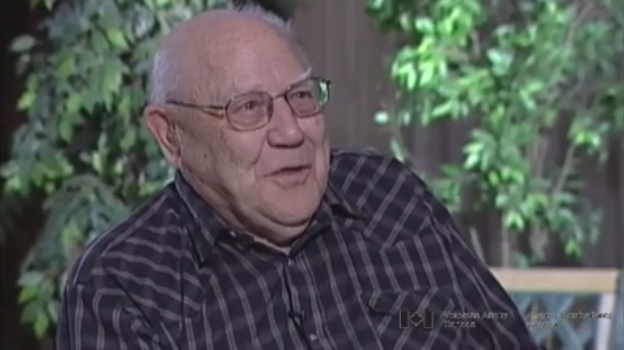Every Place He Stepped, I Stepped
Heroes Remember
Every Place He Stepped, I Stepped
Transcript
We landed over in Belgium, Belgium was clear at that time,
and went through all the medicals again and so on there.
And I think we were at Ghent, I can't remember we went for the
first time, and they took us up to the front there, which was in
the Scheldt Estuary at that time. The Scheldt has just got open,
had just, the troops just got in there. So we went in there maybe
a couple days after they had, the waterborne nine across there.
And they all puts us in the Highland Infantry, some of us in the
Highland Infantry that's where I ended up with some other
regiments you know reinforcements. And I do remember it was kind
of a mucky mess there because it's low ground, and it's wet.
And we took out a big fortress there they called Little Tobruk it
was near, Knokke it's Knokke-Heist now but it was Knokke-sur-Mer
at that time. And big sand dune and like that, and they had
trenches all dug along the top and camouflage. They had one place
in the middle of it all, you know it was just like a great big
town there for snipers. He had the ranges marked off, in fact he
shot two or three of our fellows before we got him. And I was
Bren gunner at that time, and I went in the dikes there and had
my, you know Bren gun this, I forget now, this way, and he put a
gall darn shot between two front legs of the Bren gun that was
underneath this arm like that, so I started shooting this way
then. So it was about that time two of the, the sergeant's
talking to the officer behind me, Major King, and he said,
"Did you think that's a mine field ahead of us?" It was marked
for mines there, he said he didn't know, had to go through it
anyways. So he said to one fellow, you know he had the wire
cutters, go and cut that. Well he wasn't gonna go in there.
Prick anyway, excuse the language. But anyway, I got stuck for it
and the sergeant said, "Come on Tomlin." Crossed this place that
was marked mine field, and every place he stepped, I stepped.
If he was going to get blown up, I wasn't if I could help it.
So we got through, we cut some wire, and the other guys from the
section come through then, followed our footprints through,
I don't know if there was mines in there or not but we,
nobody got hurt anyway. Got in on this here kind of a paved place
and some German prisoners started coming out. One wasn't moving
fast enough so the sergeant went to take a king of shove him with
his foot. When an Indian fella was kinda took a jab at the guy's
hind end with a bayonet. Met the sergeant's ankle half way then
put the bayonet through his ankle. Sergeant was a D-Day boy like
that, he said all the trouble he's had like that, he says get
wounded by his own men he never left. He took some rum out of his
water bottle and poured it through the wound, kept on going,
never did get out. But he won the DCM, I guess for that I think.
Because on his citation there I had to kinda laugh when it said
that, Sergeant Norman Tuttle accompanied only by his Bren gunner,
did this, cut the wire and so on and so forth. And I put down
above it, I wrote in the book of the HLI's yes he got the DCM and
I got the shit scared out of me. So anyway, he was close to me.
He was a good man, he deserved it because he was a D-Day man.
He was a leader, he's a good man. But we got into that area then
and we cleaned it out, we took a lot of prisoners. Some of them
were going to fight 'til the end but after when we told them,
we threatened we'd send over the aircraft to bomb it, we throwed
in the flamethrowers and everything else they surrendered.
In fact, we got quite a few high ranking officers because
they were completely surrounded at that time.
Description
Mr. Tomlin describes the capture of 'Little Tobruk,' a German gun position in the Scheldt
Glen Tomlin
Mr. Tomlin was born in Clinton, Ontario, in 1923. His family moved to Harriston when he was very young. Once he was old enough he worked in a box factory earning $7/week for 60 hours of labour. Despite having had rheumatic fever, which made it impossible for him to walk at a marching pace, Mr. Tomlin was accepted by the army, where he trained as a field gunner. He later switched to infantry, joining the Hard Light Infantry, 9th Brigade, 3rd Canadian Division. Mr. Tomlin's service saw him in several combats in Northern Europe, often engaging the enemy at very close quarters. Mr. Tomlin now resides in Palmerston, Ontario.
Meta Data
- Medium:
- Video
- Owner:
- Veterans Affairs Canada
- Duration:
- 3:48
- Person Interviewed:
- Glen Tomlin
- War, Conflict or Mission:
- Second World War
- Location/Theatre:
- Belgium
- Battle/Campaign:
- Battle of the Scheldt
- Branch:
- Army
- Units/Ship:
- Highland Light Infantry
- Rank:
- Private
- Occupation:
- Gunner
Related Videos
- Date modified:




